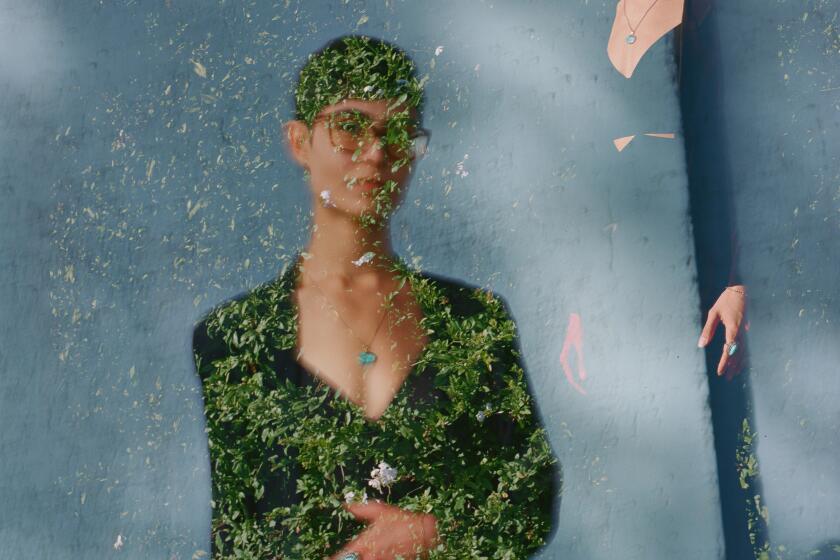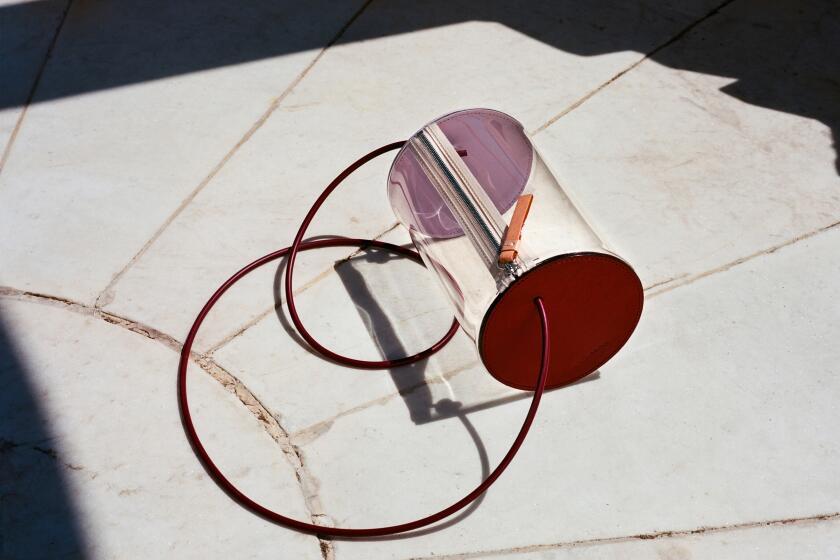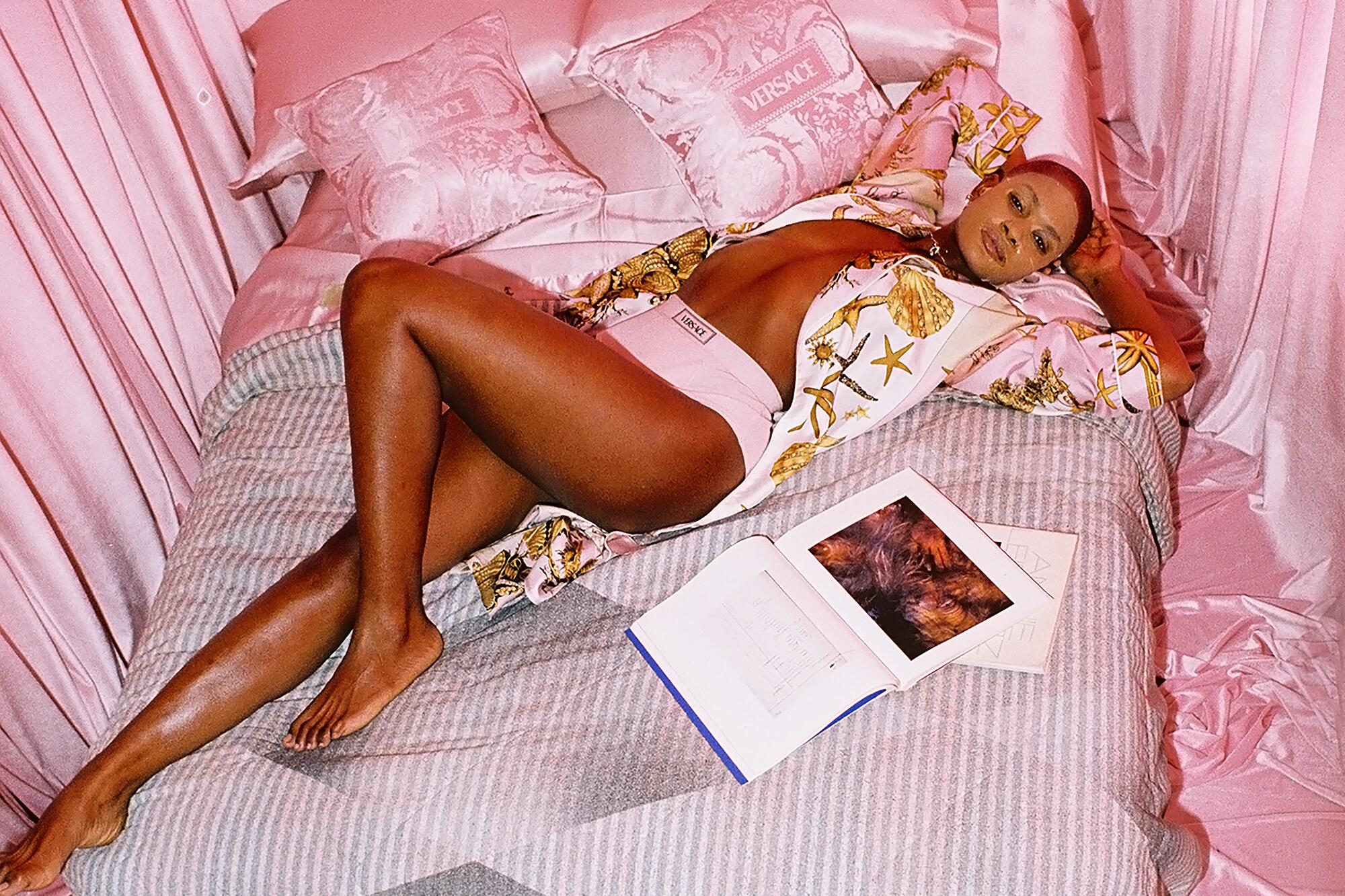
- Share via
This story is part of Image’s May issue, Homemaking, about home and the many ways we choose to make it.
I only sleep in silk. It’s a bit of a dirty secret.
This isn’t the type of thing you want to admit to a friend, much less a stranger. It’s undemocratic. Polyester isn’t good enough for you? Rayon, viscose, all the leaps and bounds made in synthetics — don’t you believe in science?
Fine silk runs through the fingers like soft water. It drapes without hiding your lines or curves — but can, if woven with enough heft, still deliver on structure. In the right color, it is impervious to sweat. With a little Woolite — and the stomach to ignore the tsk-tsk of “dry clean only” — it’ll survive a hundred washings. Silk comforts and cocoons, so light it practically hovers. I sleep in silk. I cook in silk. I clean in silk. I live in silk — it’s all I wear when I’m at home. (And, often, an apron.) Why dress up to go out when you can dress to stay in?
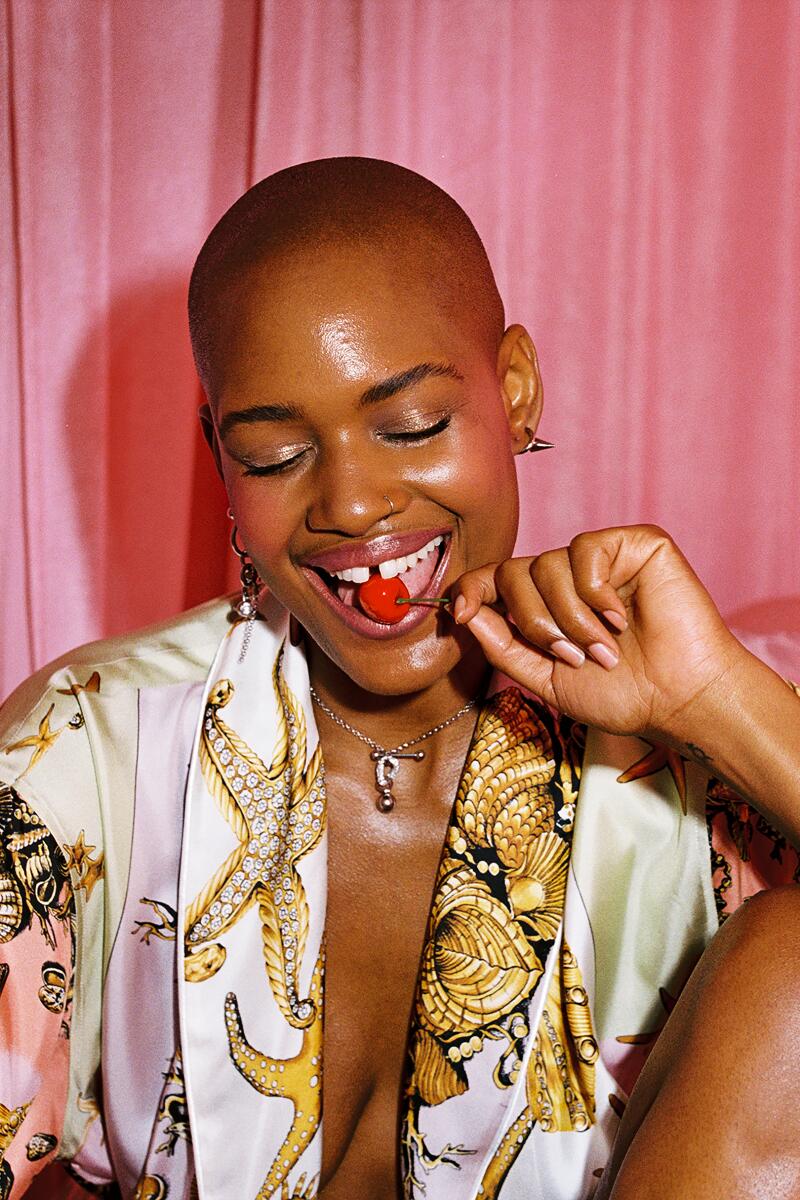
Pamela wears Versace briefs and robe , Justine Clenquet earrings and necklace.
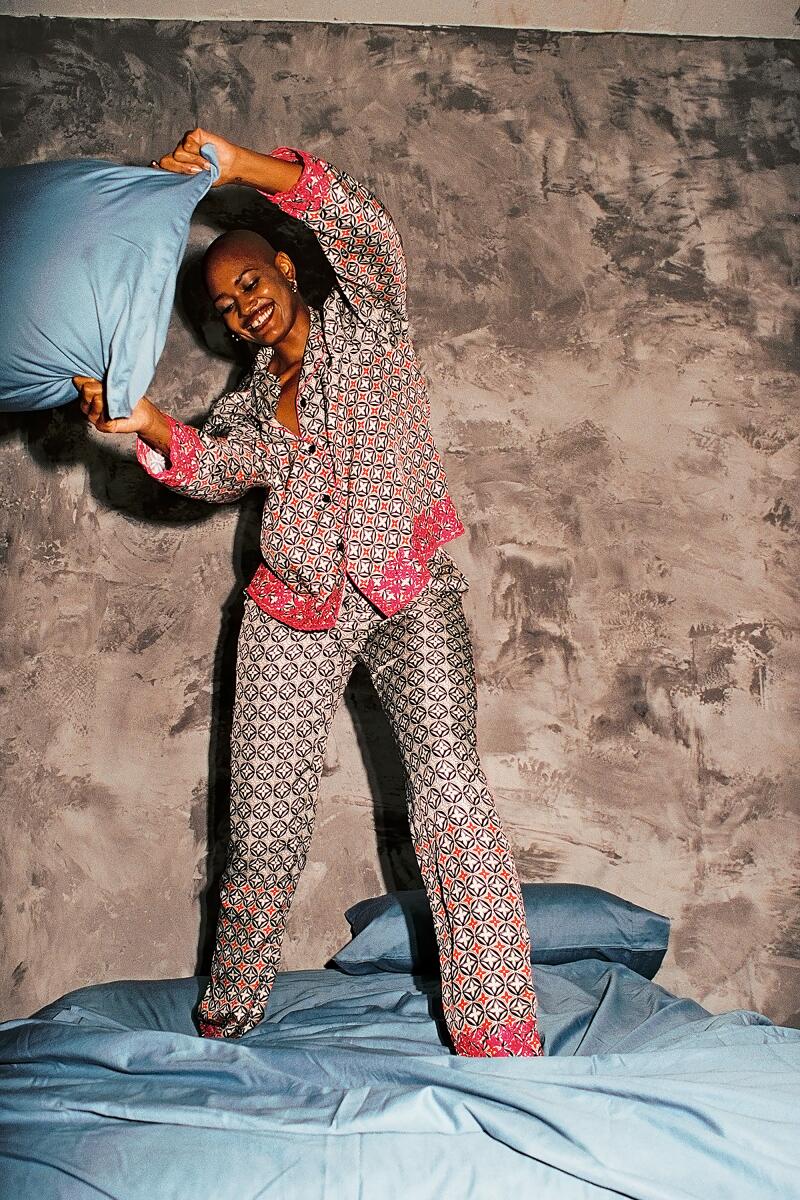
Louis Vuitton pajamas, Justine Clenquet earrings.
Like many immigrant families, the one I grew up in drew a hard line between inside clothes and outside clothes. (Or maybe it’s not about hyphens but just having some manners; as Phoebe Robinson says, “Please Don’t Sit on My Bed in Your Outside Clothes.”) Outside, the world is covered in dog s—. Plus a good deal of pollen that will have me up all night hacking. Inside, my bare feet walk on the qilim my mother “lent” me 15 years ago, and the air’s laced with cardamom from my decaf-black virgin nightcap. Inside, there’s a candle burning and a ban on overhead lighting. Inside, one rule reigns: respect the sanctity of Inside.
Pajamas, you see, aren’t just for sleeping. They’re inside clothes. This is a lesson the pandemic brought home to everyone, but for some of us it’s always been so.
The word “pajama” stems from Persian/Farsi, as I learned in my medieval Persian seminar in college after a life of speaking Farsi at home but somehow never registering the echo of this particular cognate. A compound of “pay,” or leg, and “jāma,” cloth (as in, clothes), the term first traveled to India via the Mughals, who spoke Persian at court. We’re talking the 1500s. A few centuries later — as a Dolce & Gabbana blog post on “the pyjama” also so kindly explains — the word, and corresponding style of loose pants coupled with a matching top, then went West via the Raj: colonial Brits stole the breezy unisex look from their subjects. In short, as an Iranian, I come from a long uninterrupted line of pajamas. Though probably in cotton.
When I was a kid, I also had a few nightgowns. My favorite my mother had sewn for me. Puff sleeves, peach and brown stripes. Memorialized, these days, in a snapshot of me and my childhood best friend on her family’s pullout couch, Nick at Nite on the TV.
I am not the modern, modest Muslim lady my mother wanted, nor the good wife my grandfather must have envisioned in a daughter-in-law or granddaughter. The old bling glares and guards me.
Historically, nightgowns, opposite from pajamas, traveled from West to East. And they didn’t start out femme — in medieval Europe, men and women alike retired for the night in long, loose shirts. Today nightgowns are pretty much dead. But there was a time when Dior could dress you so good in lace and pastels it’d make you want to wear makeup to bed. Now few luxury brands bother, including Dior. (Albeit the occasional exception, like this truly wild floor-length, rhinestone-encrusted sheer getup by Dolce & Gabbana.) Probably for the same reason, I no longer have any nightgowns. First Wave feminism-slash-medieval Muslim culture has finally crashed on the shores of fashion, and women wear pants. Dresses can be restrictive. I like to lounge with one leg up.
Since those childhood days of puffs sleeves past, I’ve accrued a small collection of adult pajama sets. Window-shopping for my next set, I come back across the garment’s colonial lineage. A matching set by Dior — clearly I’m dreaming — features a generic jungle scene as the house’s take on Toile de Jouy (i.e., fussy French pastoral). Prints of “exotic” flora and fauna have become such a mainstay of luxury pajamas (see: Olivia von Halle) that we don’t even notice the history behind them. I’m not calling for a boycott, but every now and then, I like to see how the sausage gets made.
Inside you are your main audience. The joy lies in the freedom. Be extra. Go bold.
Me, I like it simple. But always in silk.
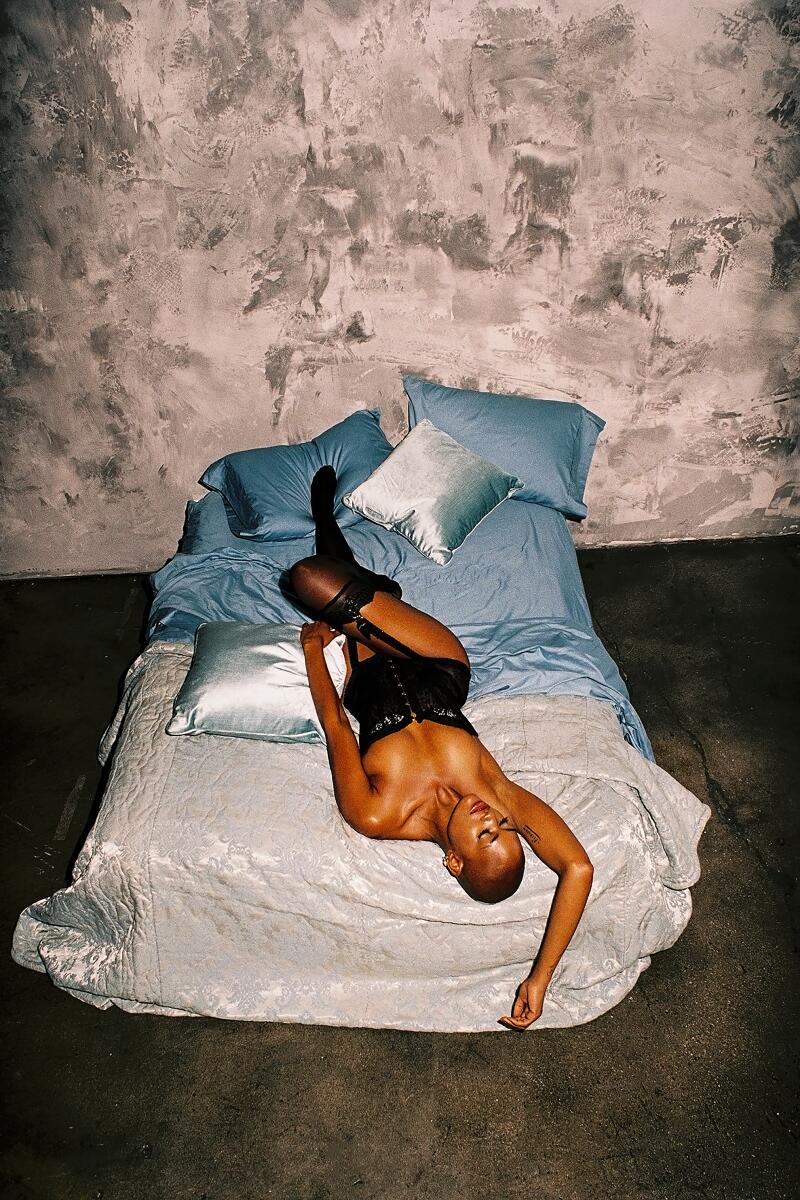
Pamela wears Agent Provocateur lingerie, Wolford stockings.
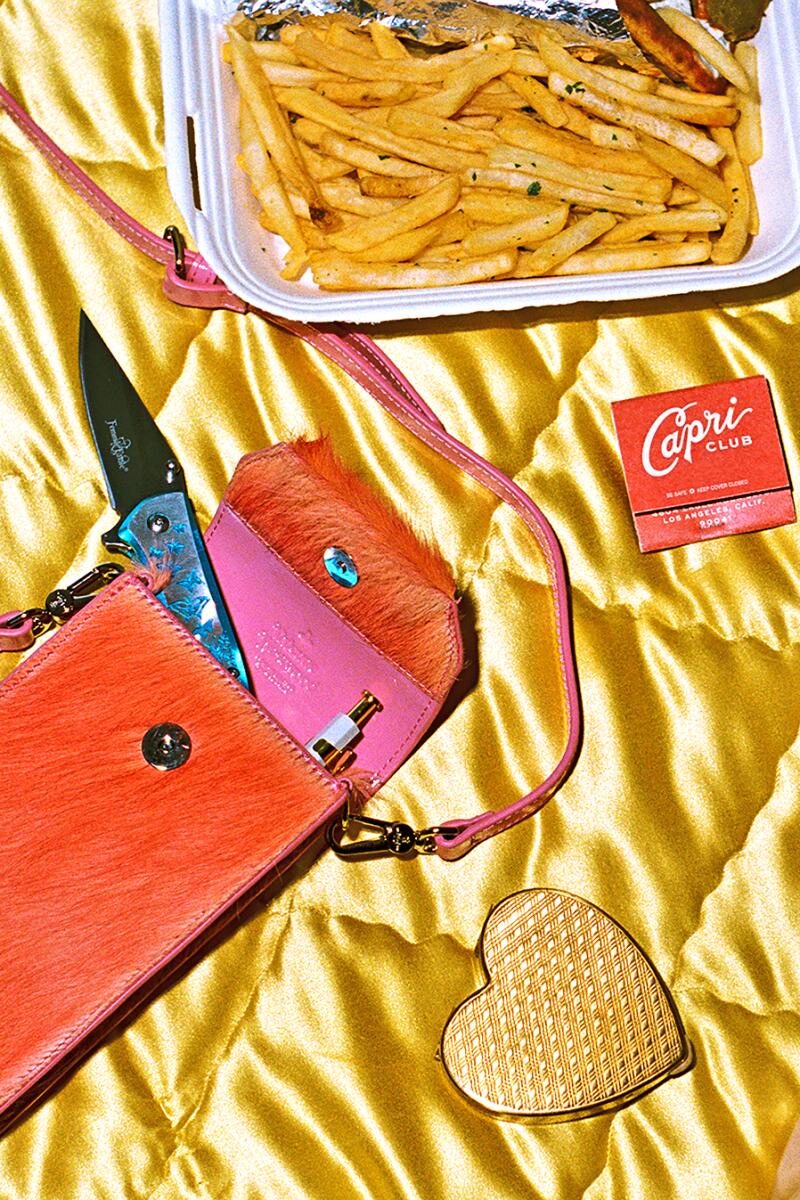
Vivienne Westwood phone purse.
My first set of silk pajamas came relatively late in life. Christmas in Fort Greene, my mid-20s. It was snowing. The kind of snow that feels like the first snow even when it isn’t, those light bright flakes that hang in the air so mournfully and beautifully you’d think you were on set for the holiday special except you can feel them melting on your chapped lips. There were so many firsts that year. My first apartment shared by an “us” that wasn’t simply financial, wasn’t me and a roommate. My first — in the form of our first — Christmas tree. (I didn’t grow up celebrating.) And, surely just as momentous, my first foray into pure silk.
Black silk with black piping. Fat black buttons, curved lapels. Long sleeves, long pants. Men’s. We’d gone Christmas shopping in the snow at the Brooklyn flea. When the scrawny guy draped over a folding chair across the stall saw me thumbing the package, he assured me that all his “girlfriends” wore them in an S, as if I needed an excuse to shop menswear and women only came in one size. He quoted 50 dollars for the set, a price that seemed at once fair and substantial. Back in the apartment that night, too lazy to iron out folds creased by time, I let more time and the wet heat of my body shake out the fabric.
Totes can get old. Specialty bags can’t carry anything and make you work for them. But the Cylinder Sling by Building Block flirts with such attitude without becoming rude or insensible.
Going silk is like what I imagine it felt like to step into the ’70s and burn (i.e., toss) your bras — there’s no way back. Now I have silk for every season — just a piece or two. Princesse tam tam cami and shorts in cherry red — not the skin but the flesh, which is redder. Another Princesse tam tam cami (black, bustle button detail) whose matching bottom I spent hours searching for in vain (such are sales). Thrifted and gifted to my beau before I took it back, a silk men’s tee by Cos big enough to serve as a micro-dress. Actually gifted to myself for a pandemic birthday, a classic Sleeper set in high-shine satin, the color an indulgence in itself: cream, as in farm-fresh and organic. And, I must say, way too high-maintenance. Like after I’ve done my own mani — for hours, I can hardly lift a finger without fear of effing something up.
True luxury lies in ease. As in donning that old black pajama set, day after gray rainy day, this past L.A. winter. Silk lasts. After over a decade of sitting cross-legged on the sofa in these silk pajama pants, reading or watching something; after over a decade of tossing and turning in them as I made and remade myself in cities and careers that were miles and miles apart; after over a decade of washing them, not by hand like my other silks, but by throwing them in the monstrous machine at the laundromat with regular detergent, and yes, sometimes, even machine-drying them (come out soft as a caterpillar) — after over a decade of use and abuse, I only just recently had to have a couple seams resewn. This stuff is ox-strong. Twelve years of sweat and soap, and now when the fabric ripples, black fades to gray, thick with light. You can’t buy patina like this.
Clothes are our closest homes, our first layers of shelter. I guess most folks think they’re only worth investing in when there are strangers to impress. But I want to say that being inside, being alone, is important. Maybe you’re no raja or rani, but your skin might like the touch of silk.
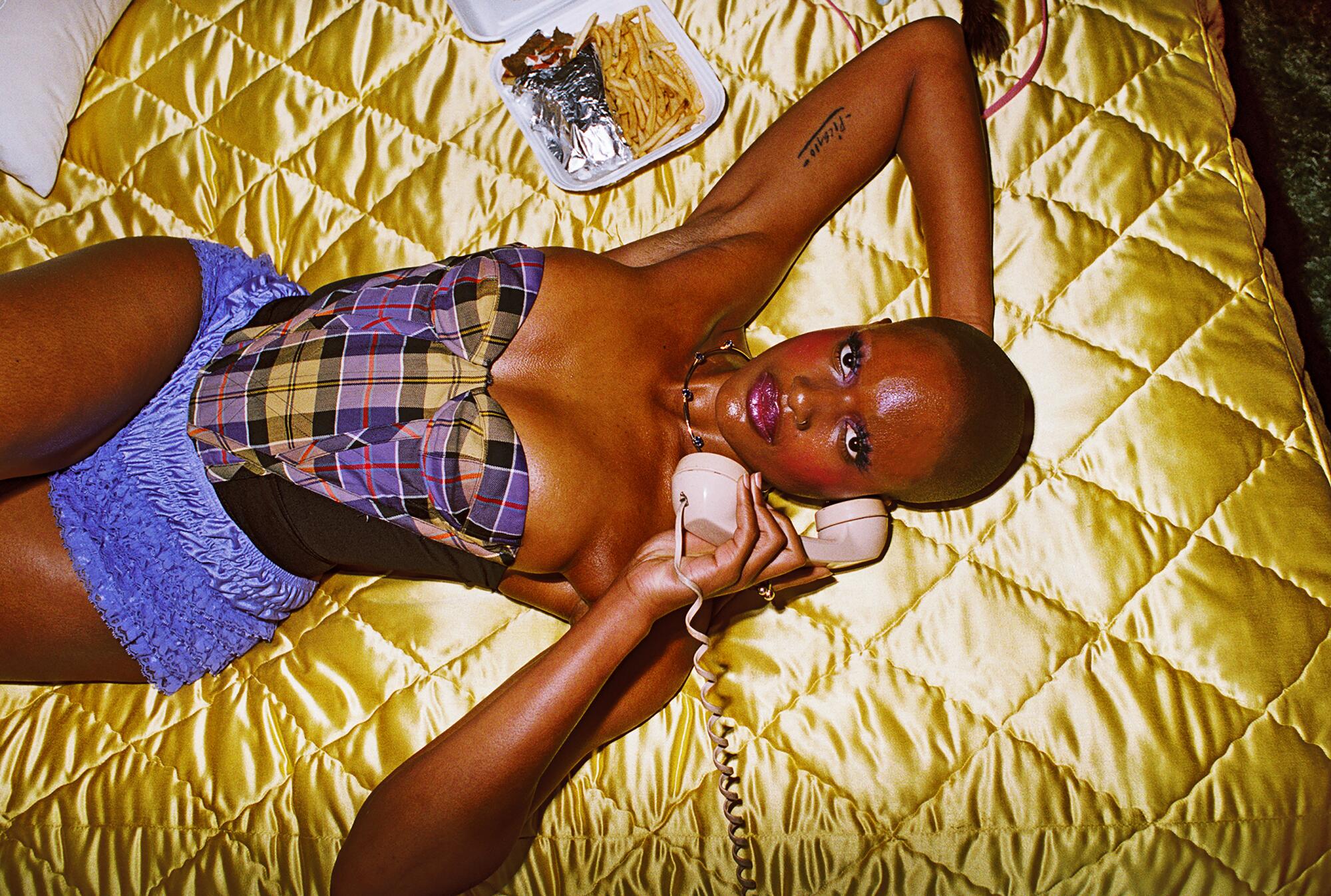
Production: Mere Studios
Model: Pamela Holmes
Prop stylist: Gina Caravan
Makeup: Carla Perez
Photo assistant: Nicholas Mora
Prop assistant: Jessica Ayala
Mariam Rahmani is a writer and translator. Her first novel, “Liquid, A Love Story,” comes out in March from Algonquin. It takes place between L.A. and Tehran.
